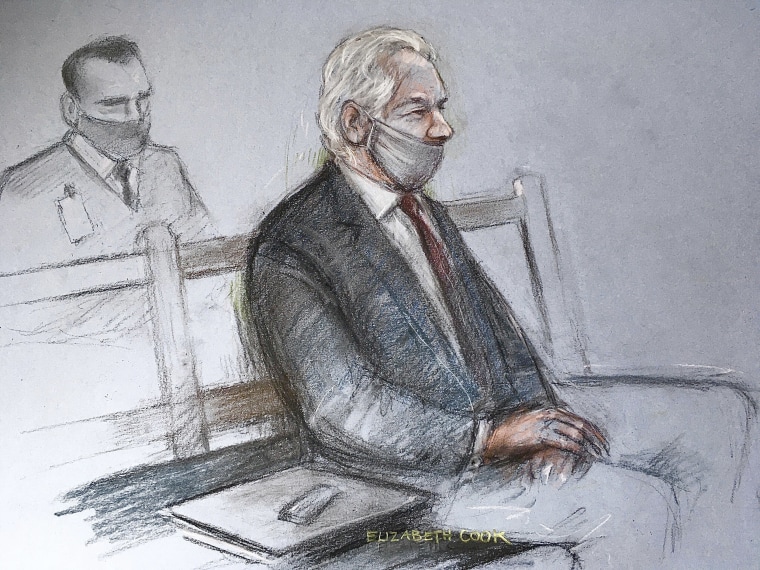LONDON — WikiLeaks founder Julian Assange cannot be legally extradited to the United States to face espionage charges because of concerns over his fragile mental health and the risk of suicide, a British court ruled Monday.
Lawyers acting on behalf of the U.S. government have already said they will appeal.
District Judge Vanessa Baraitser delivered her decision at London's Old Bailey court in a case that has pitted national security against freedom of expression. A crowd of reporters gathered outside as a small group of supporters chanted "Free Julian Assange."
"I find that the mental condition of Mr. Assange is such that it would be oppressive to extradite him to the United States of America," the judge said in her decision.
If extradited, Assange, 49, would face a maximum of 175 years in prison if convicted on 17 espionage charges and one charge of computer misuse.
The case was adjourned to Wednesday when Assange's defense team will argue he should be released on bail while the U.S. appeals the ruling. Assange, who will remain in custody until then, has not been out in public since he sought refuge in the Ecuadorian embassy in London in 2012.
Assange listened silently to the judge's summation, wearing a blue suit and gray face mask.
Assange's defense team argued that the U.S. action against him is political and therefore incompatible with the U.S.-U.K. extradition treaty. The judge said this "didn't provide the basis to prevent" his extradition.
But Assange's team argued that he could not be extradited on health grounds and Baraitser accepted that Assange suffers from clinical depression and had struggled to control thoughts of suicide or self-harm. The judge agreed with this argument and ordered his discharge.
The judgment quotes a psychiatrist, Dr. Michael Kopelman, who evaluated Assange.
“I am as confident as a psychiatrist ever can be that, if extradition to the United States were to become imminent, Mr. Assange will find a way of suiciding,” according to Kopelman.
Assange has said he was acting as a journalist but Baraitser said the WikiLeaks founder's activity in receiving hundreds of thousands of classified files from U.S. Army intelligence analyst Chelsea Manning went beyond investigative journalism.
The judge dismissed a range of Assange team protests about the extradition, including their claim that a jury in any U.S. court action will be made up of government employees and therefore biased, and that he will not be afforded protections under the U.S. Constitution.
"I've considered and rejected any suggestion that as a foreign national Mr. Assange would not be afforded the protections of the U.S. Constitution," she said.

The U.S. Justice Department said in a statement in reaction to Assange's extradition verdict: "While we are extremely disappointed in the court’s ultimate decision, we are gratified that the United States prevailed on every point of law raised. In particular, the court rejected all of Mr. Assange’s arguments regarding political motivation, political offense, fair trial, and freedom of speech."
The department will continue seeking Assange’s extradition to the U.S., the statement added.
Prosecutors in the U.S. say Assange conspired with Manning to hack into a Pentagon computer and release hundreds of thousands of secret diplomatic cables and military files.
Among those files published in 2010 by WikiLeaks was a video of a 2007 Apache helicopter attack by American forces in Baghdad, which killed a dozen people.
Assange's supporters say the leaked documents exposed U.S. military wrongdoing.
Assange, an Australian national, has been in a British prison since his ejection from the Ecuadorian Embassy in London in April 2019. He was granted asylum by Ecuador in 2012 over fears he could face possible extradition to the U.S. He also sought to avoid extradition to Sweden over sex offense allegations, which were subsequently dropped in 2015.
Download the NBC News app for breaking news and politics
The International Federation of Journalists welcomed the decision not to extradite Assange, but said it was disappointed that "the judge appears not to adequately address the threat to media freedom his extradition would have posed."
The organization, which represents 600,000 journalists in more than 140 countries, has also urged British authorities to immediately release Assange.
After Monday's ruling, Assange's partner, Stella Moris, with whom he had two children while living in the Ecuadorian embassy, said the decision was "the first step towards justice" in Assange's case, but they can't celebrate until he is free.
"I had hoped that today would be the day that Julian would come home," she said. "Today is not that day, but that day will come soon."
Ahead of the verdict, Moris told NBC News that Assange was "an innocent man who's been in prison for almost two years for publishing the truth about state crimes, about war crimes, about human rights abuses. This is a stain on democracy."
Calling on President Donald Trump and President-elect Joe Biden to pardon him, she said it would save Assange's life, save her family's life and "also save the First Amendment."
"Democracy itself is at stake with this case, because it's a frontal attack on our right to know, on holding governments accountable," said Moris, who was a member of Assange's legal team.
Moris added that her children spoke to Assange daily, "but they should be with their father. They should have their father's comfort in his house. And they can't."
The U.S. extradition hearings began in February 2020 and were postponed until September because of the coronavirus pandemic.
Reuters contributed to this report.


